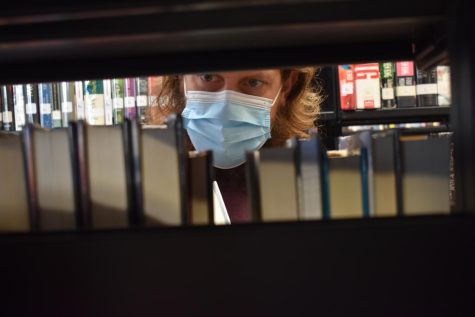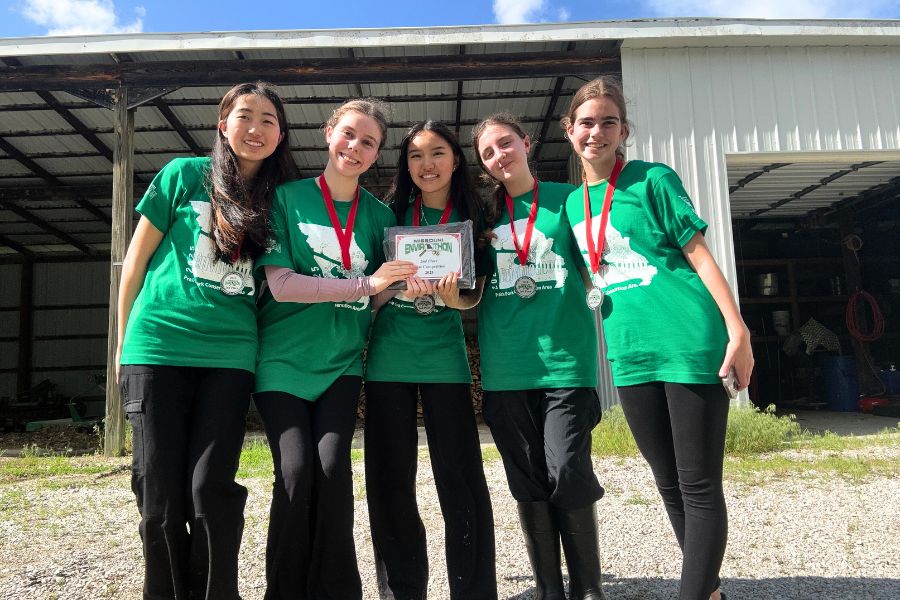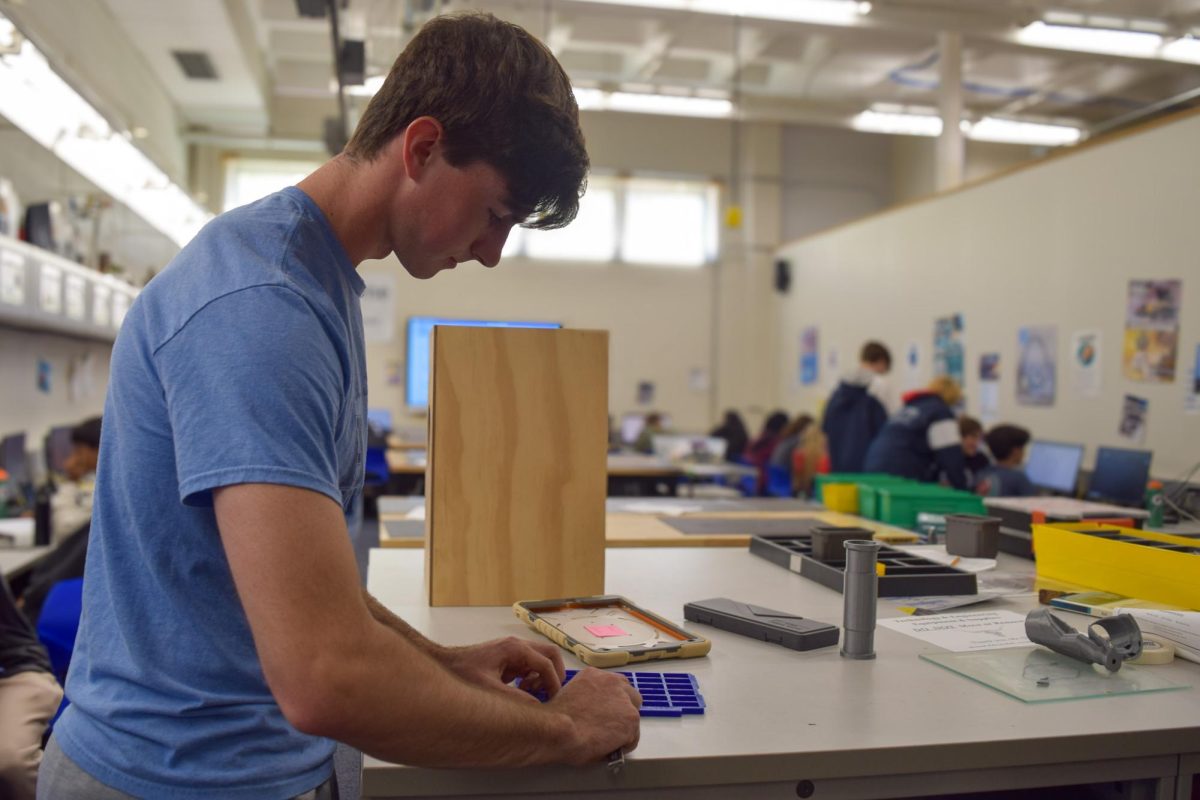Librarian Brian Welch has always loved books. As a kid, he would check out his books to his friends. He helped open a bookstore from scratch. Now, he has accomplished his dream of working in a library.
Welch started as a librarian 14 years ago and went to college to teach elementary school. He ended up getting a certification for library science after a semester of student teaching.
“I recall students that I would work with saying how much they enjoyed the books I would recommend,” Welch said. “When I didn’t initially get a job out of school, and I was doing a teacher assistant job, I was thinking, ‘well, maybe I should have another option.’ So that’s when I made that decision.”
Welch attended Missouri State University for four years. Although he has a master’s in education, he doesn’t think college is everything.
“I think a lot of how we handle education, especially at the university level, is too much theory,” Welch said. “Realistically, I feel like most people, once they get into their profession, will tell you they learned 90% of what they use from actually working there. But, unfortunately, we’re in a system. That’s the way you have to pay the piper, get a degree to get a job, so on and so forth. But I don’t necessarily think that [is] the way we are going to produce the best teachers. It is just all theory-based.”
While Welch does work with kids in a classroom environment, he says being a librarian is slightly different from being a teacher, emphasizing the difference in perspective.
“I work in the classroom with the students,” Welch said. “But, I also see them when they come [in] for openwork or in the mornings, and I get to see a different side of it. It’s a different side of students because I interact with them outside of that academic umbrella. Then, I also get to interact in the academic umbrella, which is a good blend. My favorite part of it is more so the human part of getting to talk to students and counseling them; just having fun and being alive.”
This year, Welch has been rebuilding student and faculty connections. In addition, clubs and the library have become more open with the introduction of the Academic Lab.
“Students can come into [the library] and create a cultural community,” Welch said. “Then outside of that, we’re trying to have events for the faculty and trying to keep us connected in different ways. Right now, with a lot of people, it’s easy to stay isolated because we’ve done [virtual learning] for so long. But, realistically, a school community’s strength comes from the fact that it is a community, as we found out from online learning. We miss relationships and human interaction. So here we are now, but we’re still slowly getting back to that feeling of being in a community. This is not just a school; this is something we should be proud of and have some connection to.”

Recently, the library has been expanding beyond just books. It now hosts a whole array of items, including DVDs, video games and board games, among others.
“To be a library user doesn’t mean you have to be constantly reading,” Welch said. “You can have other interests. You can rent instruments there, or you can rent a telescope. It’s more about curiosity and supporting people and their interests. That’s where we are; if we find there’s an interest in something, and we are capable of providing that in any way, we will. For example, we have a sewing machine out there. We don’t know if anyone wants to sew casually, but it’s available. We’ve got a tablet for digital artists [or] for someone who is not in a digital art class or who’s in an art class but wants to learn how to do it digitally. We’ve got that available.”
Welch believes a library is a place that helps build a thriving community in our school, whether it’s through books, puzzles or movies. He thinks they have become key in connecting students and faculty across campus.
“If you think about your classes right now, and the classes that you enjoy the most, I’m sure you have a connection with your teacher, or there’s some sort of classroom community,” Welch said. “So when you go there, there are inside jokes. There’s something that’s going on. It’s not just like this dry ‘I show up. I learn. I leave.’ Hopefully, we don’t have too many classes like that, but I think that’s what’s important in education.”

![Librarian Brian Welch stands with a library cart, preparing to shelve books. He feels that there is a lot that goes into keeping the library organized. “You always try to make yourself busy, because there's a lot to do,” Welch said. “There are things that always can be done. If you look around, you can see that there's stuff going on in this library. It's a working library, and it sometimes looks chaotic [with] stuff everywhere. But that just means we're doing our job and the people are utilizing the space."](https://pwestpathfinder.com/wp-content/uploads/2022/01/DSC_0012-900x600.jpg)
![Focused on providing exceptional service, sophomore Darsh Mahapatra carefully cleans the door of a customer’s car. Mahapatra has always believed his customers deserve nothing less than the best. “[If] they’re trusting us with their car and our service, then I am convinced that they deserve our 100 percent effort and beyond,” Mahapatra said.](https://pwestpathfinder.com/wp-content/uploads/2025/10/DSC_0018-1200x800.jpg)
![Sophomore Aleix Pi de Cabanyes Navarro (left) finishes up a soccer game while junior Ava Muench (right) warms up for cross country practice. The two came to Parkway West High School as exchange students for the 2025-2026 school year. “The goal for the [exchange] program is to provide opportunities for both Parkway students and our international exchange students to learn about other cultures, build connections and become confident, capable, curious and caring — Parkway’s Four C’s — in the process,” Exchange Program Lead Lauren Farrelly said.](https://pwestpathfinder.com/wp-content/uploads/2025/10/Feature-Photo-1200x800.png)

![Gazing across the stage, sophomore Alexis Monteleone performs in the school theater. The Monteleone family’s band “Monte and the Machine” has been releasing music since 2012, but Alexis started her own solo career in 2024 with the release of her first single, Crying Skies. “My whole family is very musical, [and I especially] love writing [songs with them],” Monteleone said.](https://pwestpathfinder.com/wp-content/uploads/2025/09/DSC7463-1200x798.jpg)
![Amid teaching a lesson to her AP Calculus BC class, Kristin Judd jokes alongside her students in their funny remarks. Judd has always enjoyed keeping the mood light in her classroom, along with on the volleyball court. “[I enjoy] that side talk where you see [or] overhear a conversation and chime in, or somebody says something funny,” Judd said.](https://pwestpathfinder.com/wp-content/uploads/2025/09/image-1200x730.jpg)
![Eyeing the ball, junior Ella McNeal poses for her commitment pictures at Clemson University. McNeal’s commitment comes after months of contact with top Division 1 soccer programs. “ It has taken a lot to get to where I am, but I know that [what] I've already been through is just the beginning, and I can't wait for what is to come,” McNeal said.](https://pwestpathfinder.com/wp-content/uploads/2025/09/IMG_4926-1200x900.jpeg)


![Senior Adam Zerega stands with senior Dexter Brooks by farm equipment. Zerega often worked with friends and family on his farm. “I've been able to go to my family's farm since I was born. I [spend] at least three weekends a month [on the farm], so I'm there all the time,” Zerega said.](https://pwestpathfinder.com/wp-content/uploads/2025/04/IMG_4872-1200x900.jpg)
